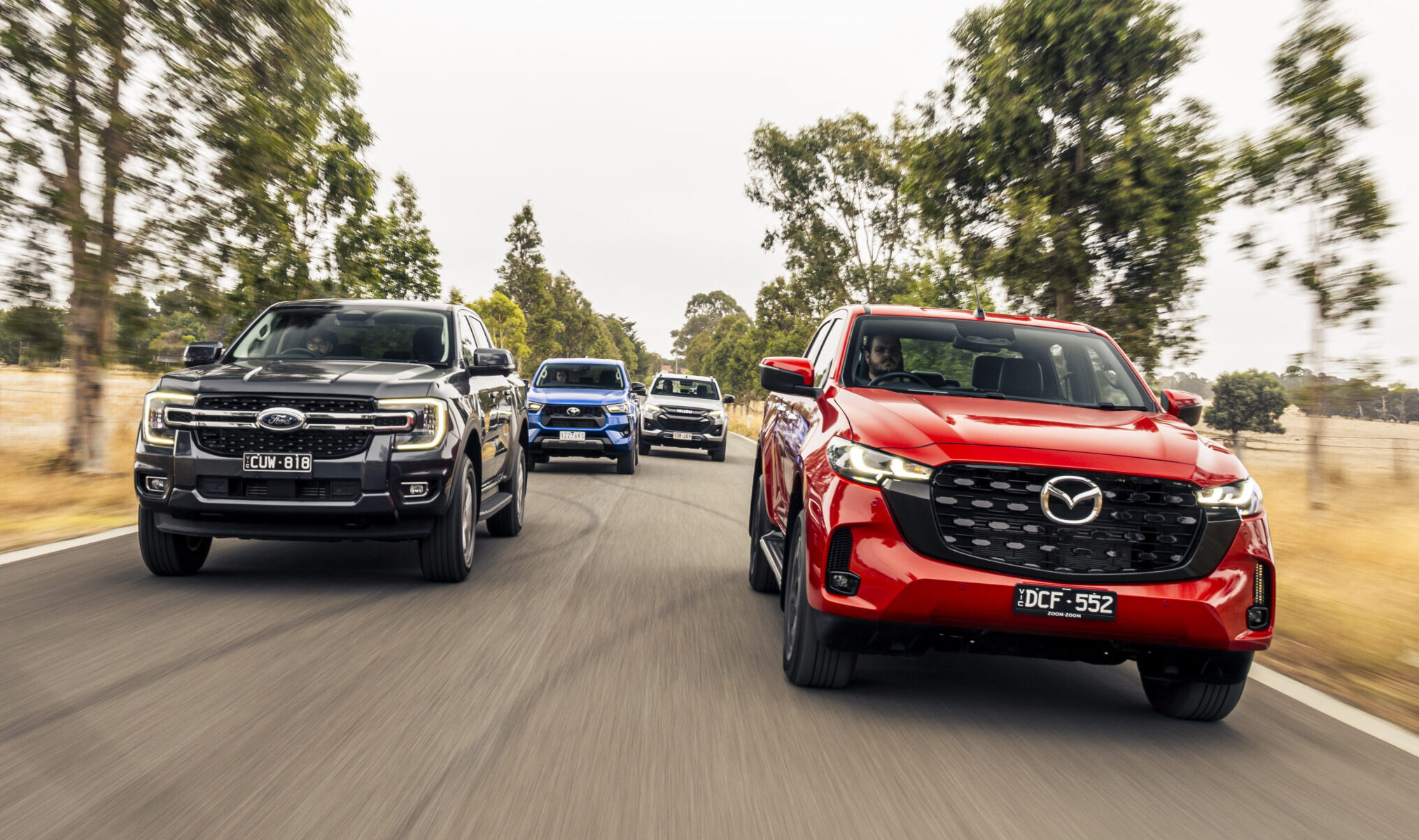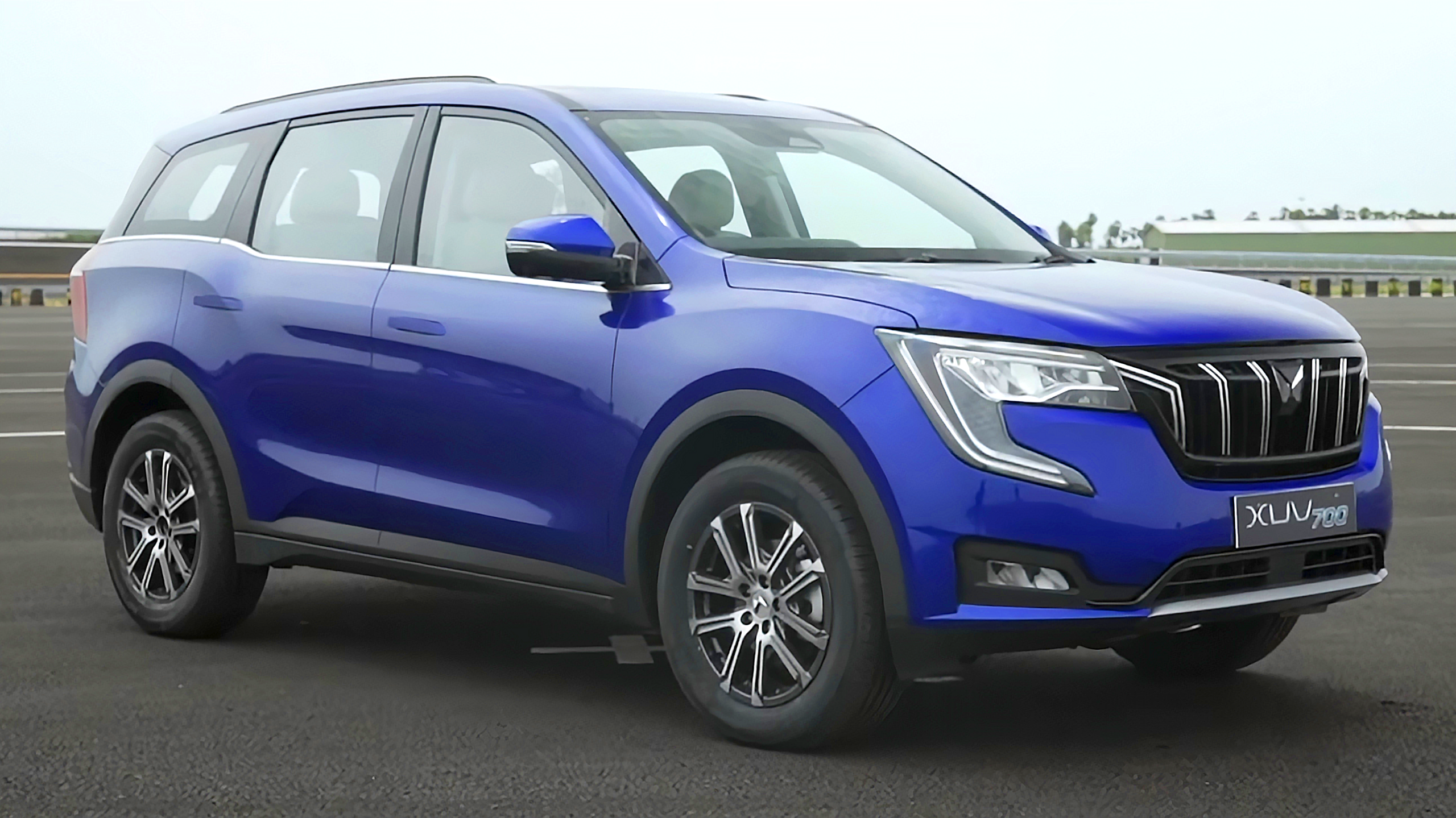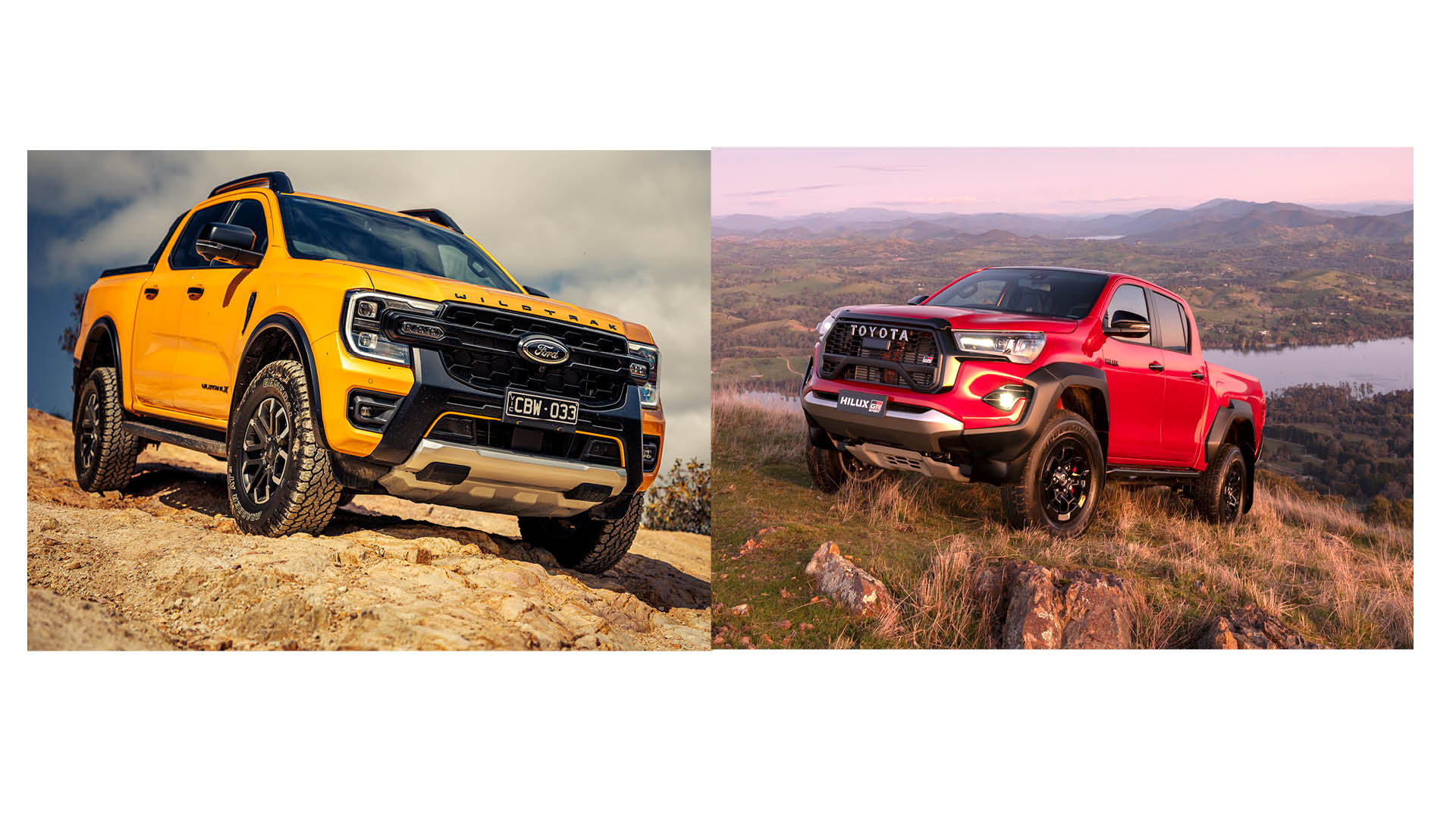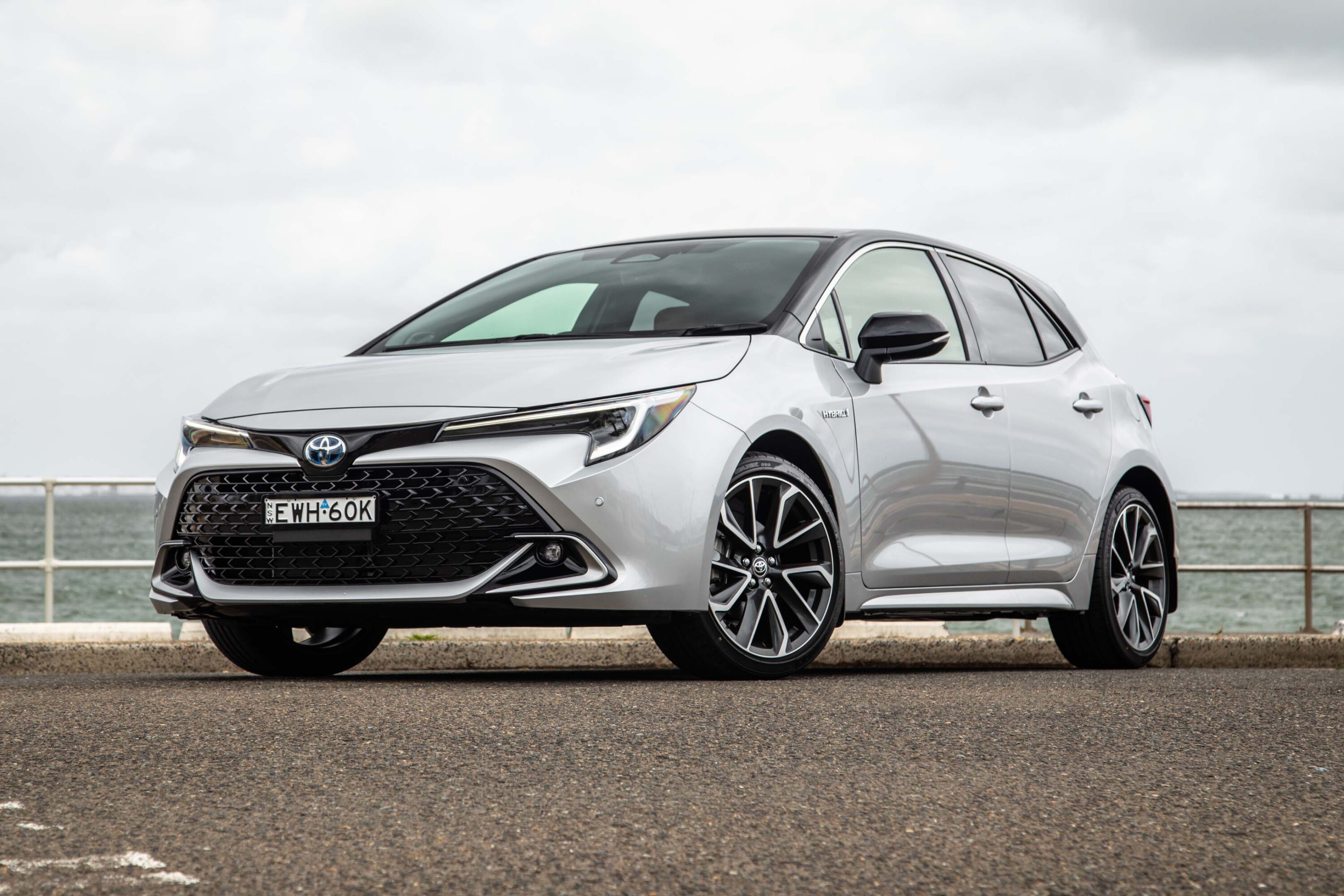
Score breakdown
Things we like
- Comfortable ride
- Fuel-sipping hybrid powertrains
- MY23’s updated technology
- GR Corolla flagship
Not so much
- Hatch’s tiny boot
- Ascent Sport’s plastic steering wheel
- Tight back seat
- Connected services cost after 12 months
The Toyota Corolla has long been among Australia’s most popular vehicles, but recent production delays and the rising popularity of SUVs saw it outside the top 10 sellers by the end of 2023, and the sixth most popular car in January 2024.
It’s a historical start to the year – one that hasn’t occurred in the last two-and-half decades of the Corolla’s existence, and one Toyota hopes won’t happen again.
Despite the recent sales slump, the Toyota Corolla remains a reliable, safe, and efficient small car with space for four passengers and driver-pleasing dynamics.
Although the Corolla has climbed in price with its latest facelift, so have its myriad rivals. As such, it remains a worthy option with SX and ZR hybrid trims representing a good balance of affordability and specification, while the rally-bred GR gives real enthusiasts a Corolla to chew on.
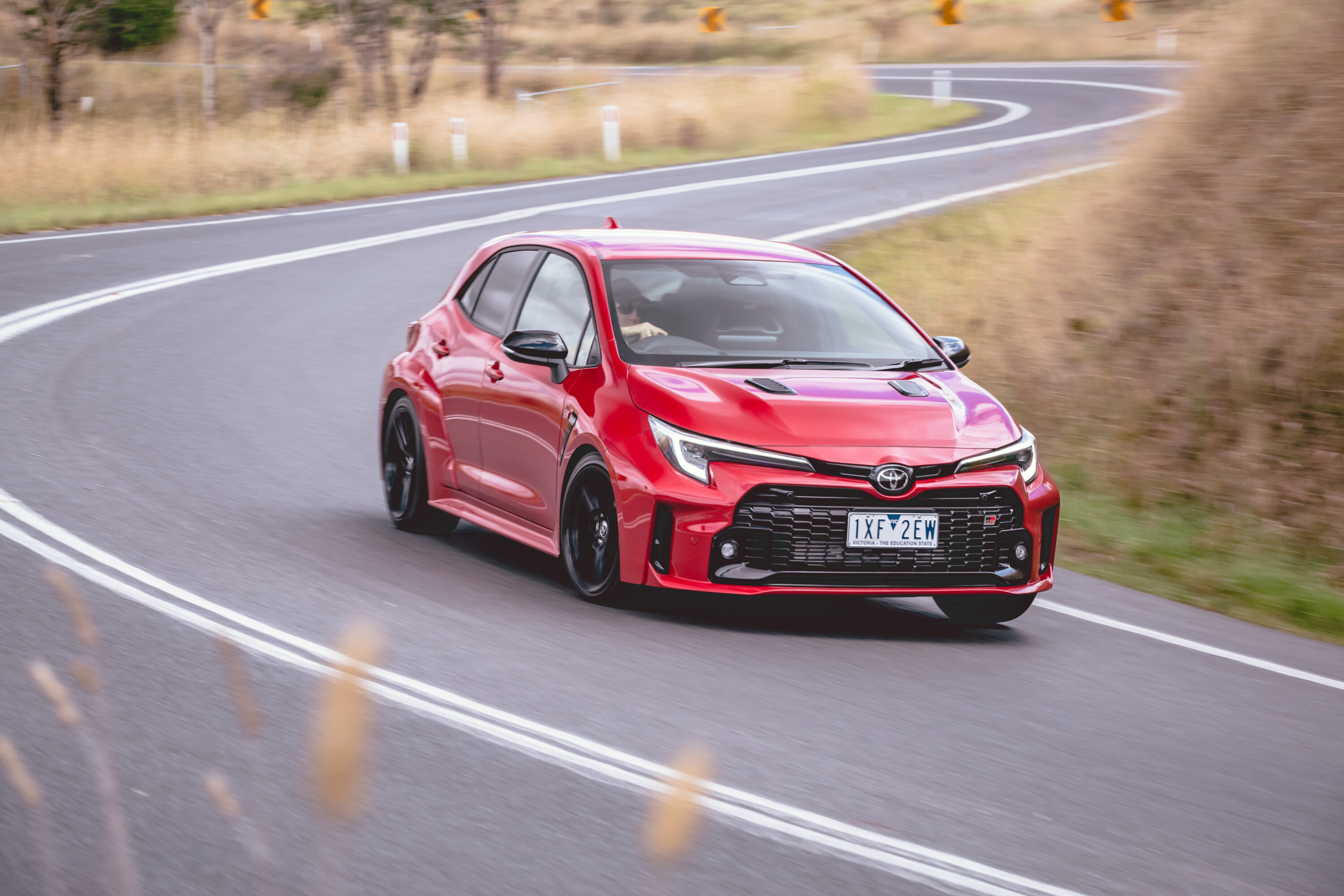
JUMP AHEAD
- Pricing
- What body styles are available for the Corolla?
- What features are standard in every Corolla?
- What key features do I get if I spend more?
- How safe is the Toyota Corolla?
- How comfortable & practical is the Corolla?
- How much boot space does the Corolla offer?
- I like driving, will I enjoy this car?
- Which Corolla engine uses the least fuel?
- What is the Corolla’s towing capacity?
- How long is the warranty & what are the Corolla’s servicing costs?
- Which version of the Corolla does Wheels recommend?
- What are the Corolla’s key rivals?
- What might annoy me?
- What might I miss that similar cars have?
- What’s the infotainment system like?
- Where does Toyota make the Corolla?
- Are there plans to update the Corolla soon?
Pricing
| 2024 Toyota Corolla range pricing (before on-road costs) | |
|---|---|
| Ascent Sport petrol hatch | $28,130 |
| Ascent Sport hybrid hatch | $30,630 |
| Ascent Sport hybrid sedan | $31,180 |
| SX petrol hatch | $31,280 |
| SX petrol sedan | $31,280 |
| SX hybrid hatch | $33,780 |
| SX hybrid sedan | $33,780 |
| ZR petrol hatch | $35,120 |
| ZR petrol sedan | $36,620 |
| ZR hybrid hatch | $37,620 |
| ZR hybrid sedan | $39,120 |
| GR hatch | $62,300 |
| GR Morizo hatch | $77,800 |
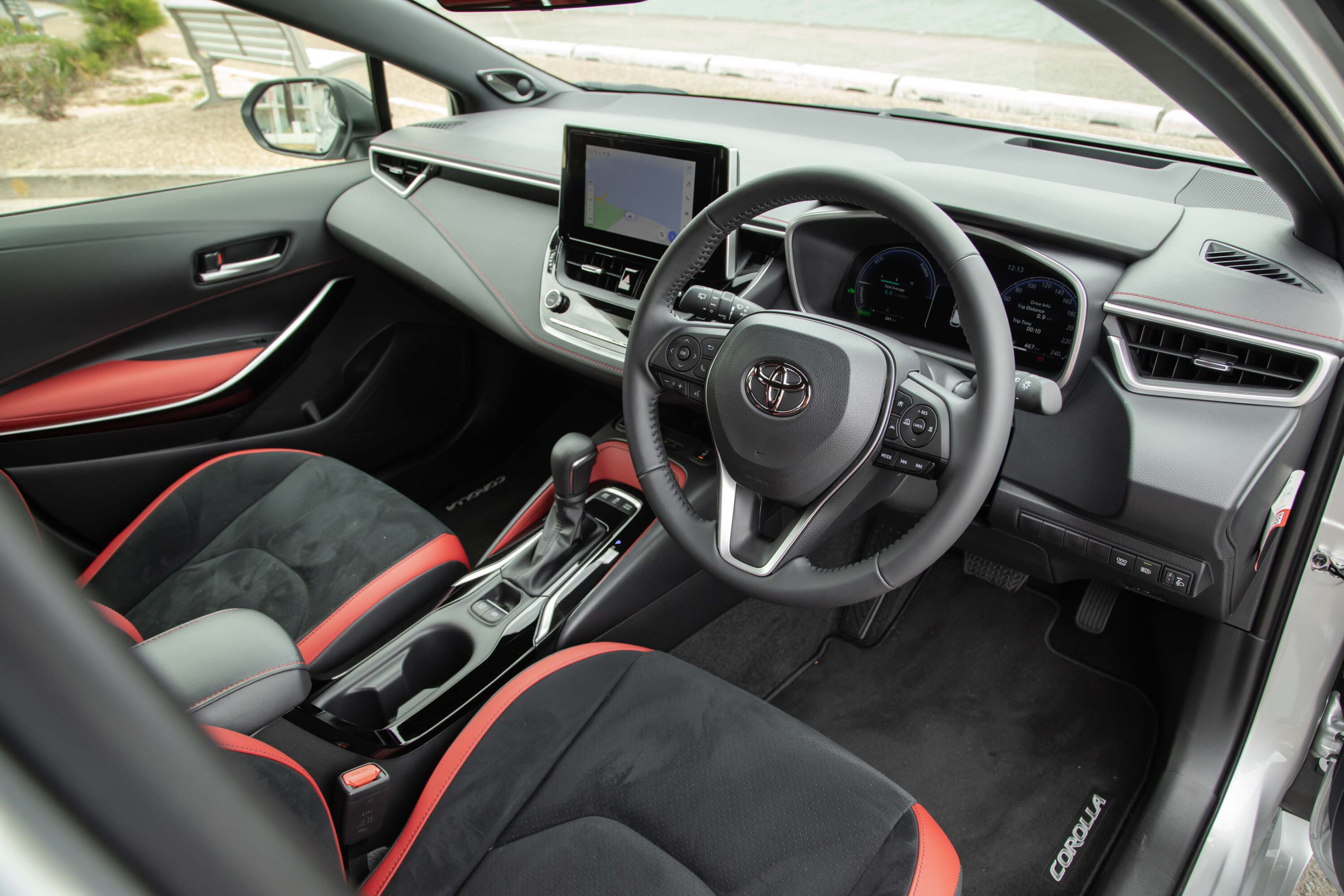
What body styles are available for the Toyota Corolla?
The Toyota Corolla is available in a more affordable five-door hatch, or the dearer four-door sedan body style.
Above the regular range sits the hardcore GR with a stiffer reinforced body shell.
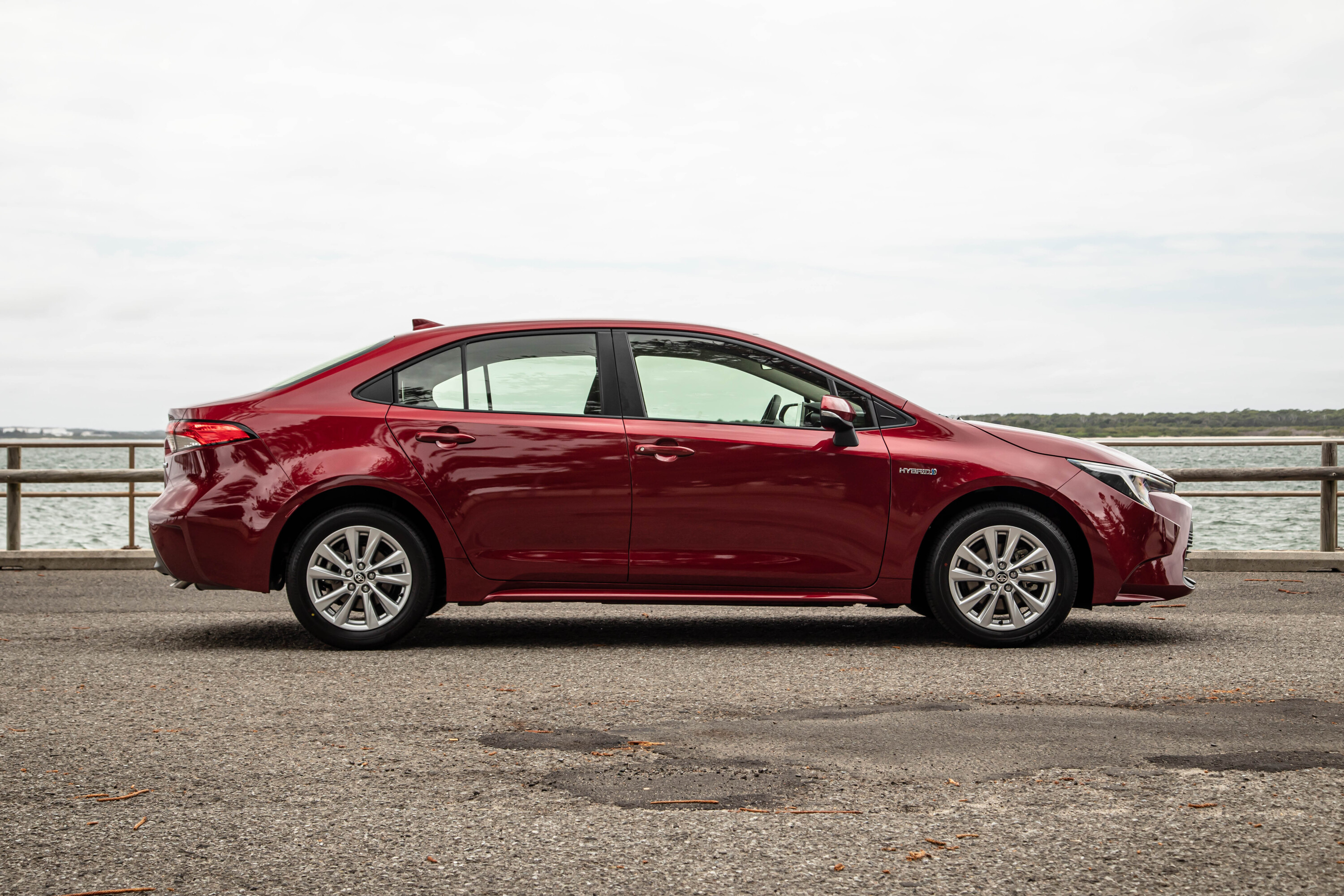
What features are standard in every Toyota Corolla?
The features listed below are standard in the entry-level model and will appear in higher-grade models unless replaced by more premium equivalent features.
| 2024 Toyota Corolla Ascent Sport features | |
|---|---|
| 7.0-inch multi-information display | Satellite navigation (sedan only) |
| 1x USB port | AM/FM/DAB+ radio |
| Wireless Apple CarPlay and wired Android Auto | Six-speaker sound system |
| Push-button start (hybrid only) | Bi-beam LED headlights |
| Over-the-air software updates | Heated, power-folding side mirrors |
| Cloth upholstery | Manual air-conditioning (petrol) |
| 12 months of Toyota Connected Services | Dual-zone climate control (hybrid) |
| Polyurethane steering wheel | 60:40 split-fold rear seats and centre armrest |
| 16-inch alloy wheels | LED interior lighting |
| 8.0-inch infotainment system | 4x cup holders 4x bottle holders |
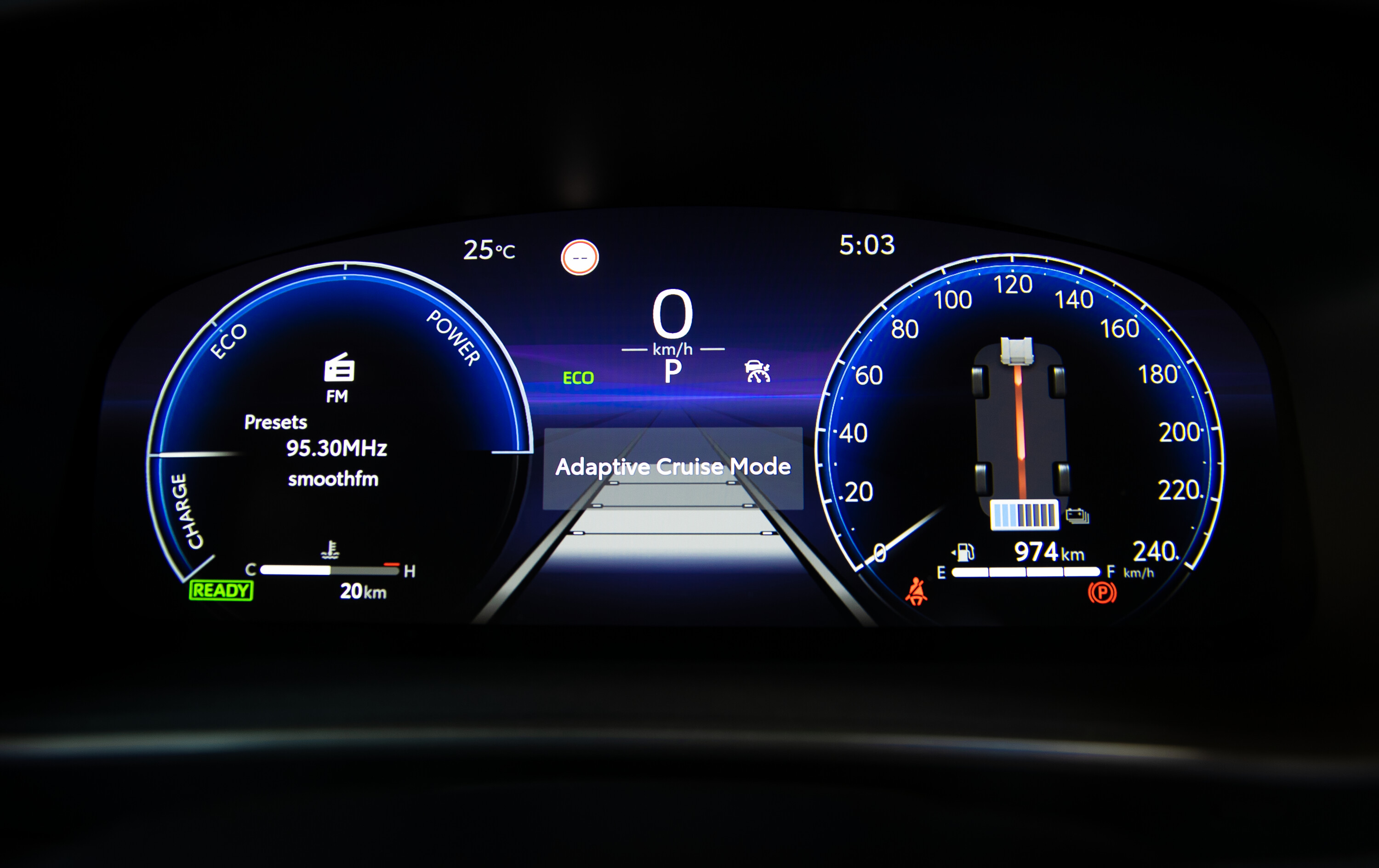
What key features do I get if I spend more?
There are three core Corolla variants, and moving up to the $3150 more expensive SX trim is worth the money.
It brings more safety and convenience features that’ll add up to a better ownership experience.
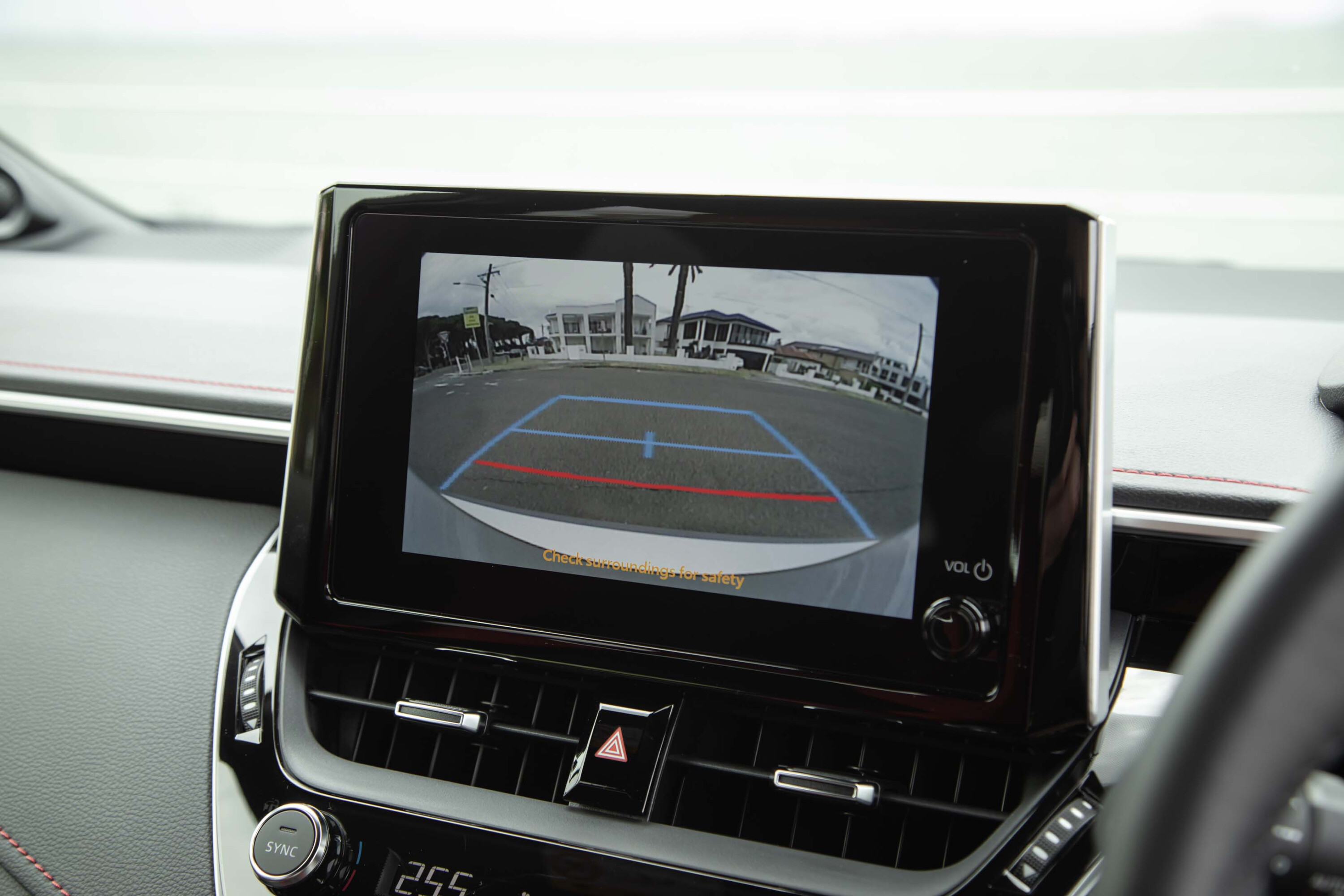
Compared to the base petrol engine – which, for a naturally-aspirated four-banger is actually quite a peach – the new 103kW hybrid powertrain is $2500 well spent.
Over time you’ll recoup the extra outlay in lower fuel costs, too. The equation will change over time, but we estimate it’ll take 60,000km of ownership to offset the cost.
An optional convenience pack brings the following safety features to the Ascent Sport for $1000:
| 2024 Toyota Corolla Convenience pack |
|---|
| Rear cross-traffic alert |
| Front and rear parking sensors (hatch) |
| Blind-spot monitoring (sedan) |
The mid-spec Corolla SX adds:
| 2024 Toyota Corolla SX features | |
|---|---|
| Paddle shifters (petrol) | 16-inch alloy wheels (different design) |
| 1x USB-C fast-charge point | Rear privacy glass |
| Wireless phone charger | Satellite navigation |
| Leather-appointed steering wheel and shifter | Rear cross-traffic alert |
| Auto-dimming rear-view mirror | Front and rear parking sensors |
| 12 months of Toyota Connected Services with remote connect | |
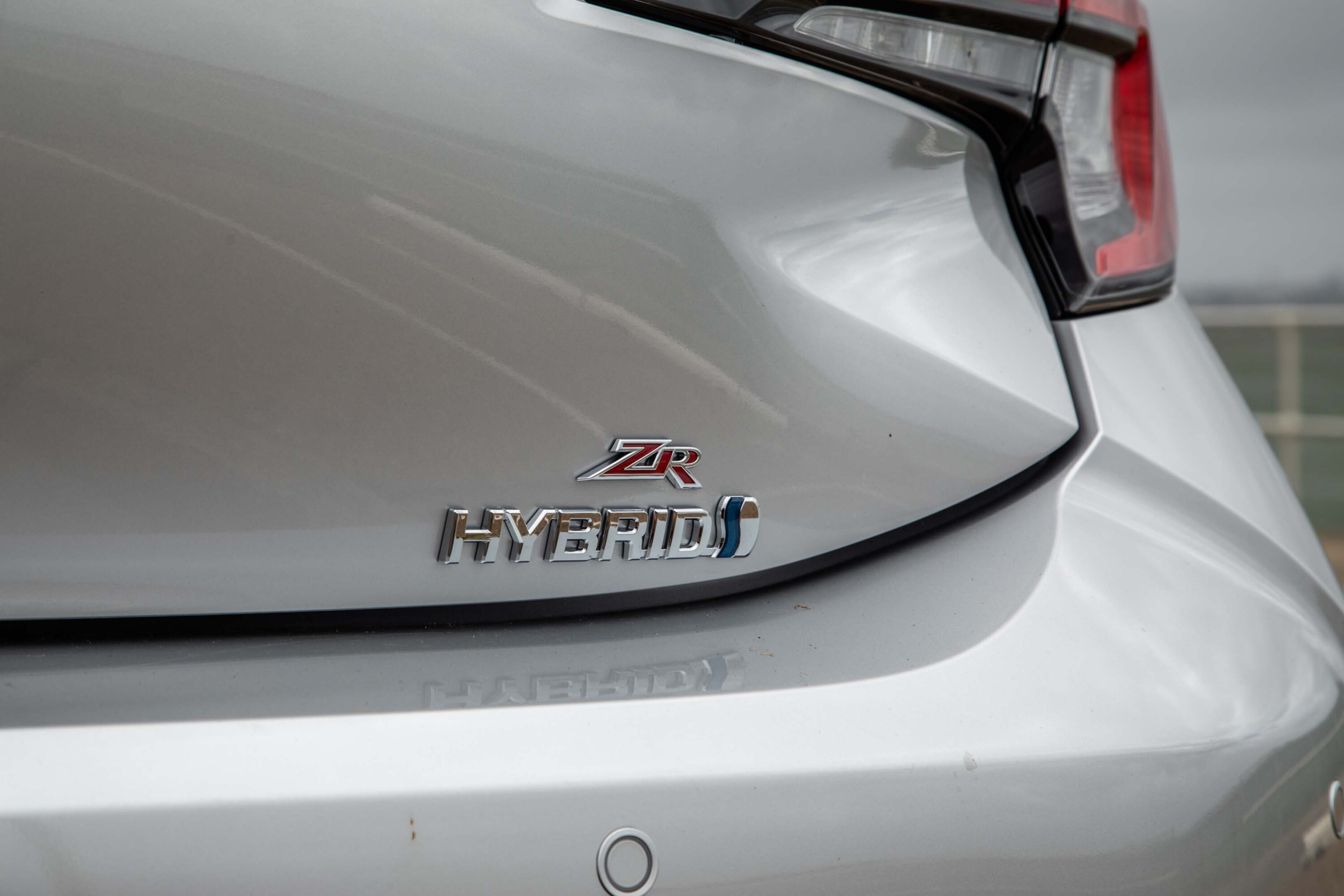
With a sporty look inside & out, the ZR is the top of the regular Corolla line.
| 2024 Toyota Corolla ZR adds | |
|---|---|
| 18-inch alloy wheels | ZR body kit |
| Dunlop Sport Maxx tyres | Premium LED headlights |
| Sports bucket seats with 8-way power adjust and lumbar for driver | Leather/ultrasuede upholstery |
| Heated front seats | 12.3-inch digital instrument cluster |
| Head-up display | 8-speaker JBL sound system |
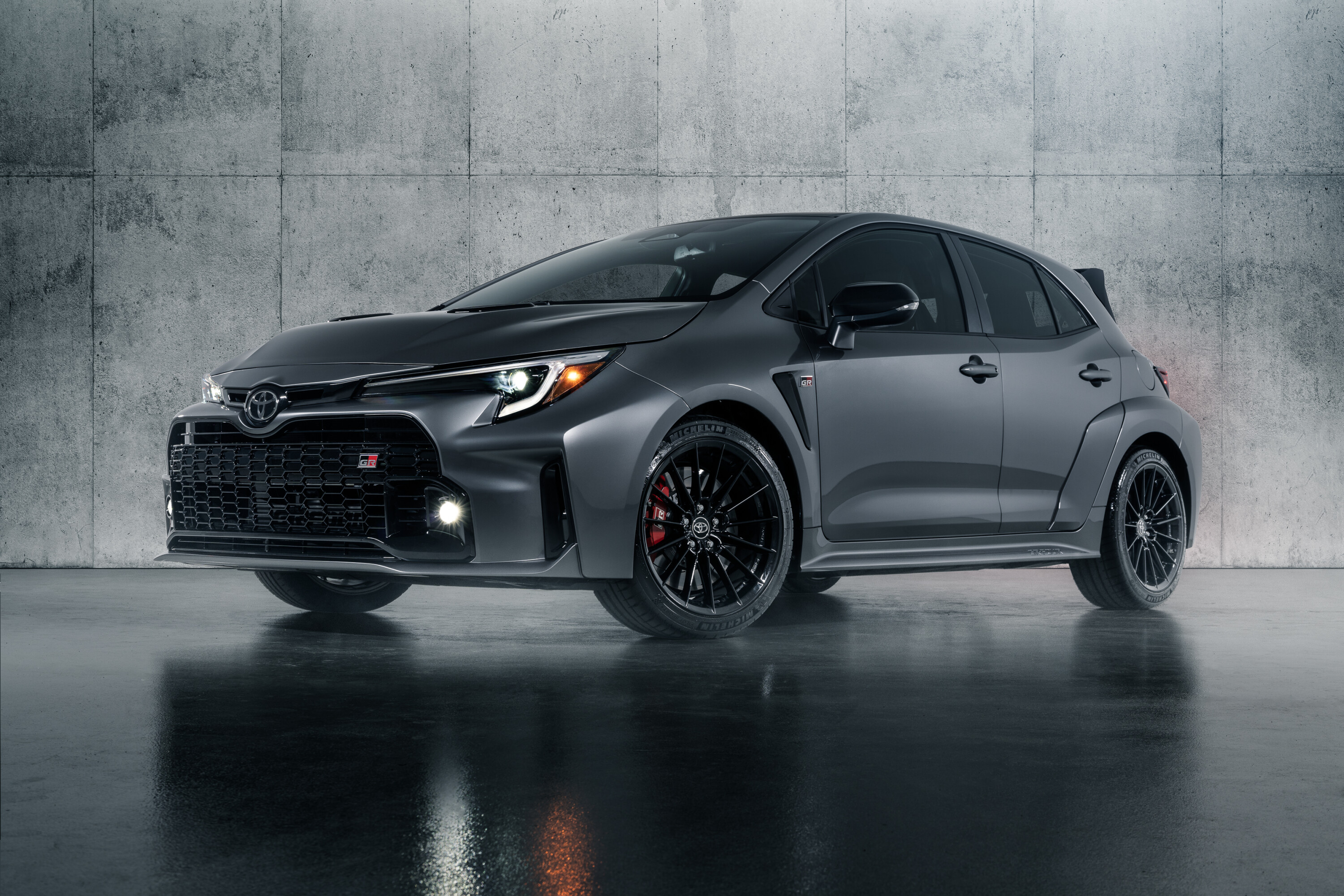
Not for the faint of heart, the 1.6-litre turbo-petrol three-cylinder GR Corolla is manual only, adding:
| 2024 Toyota GR Corolla specifications | |
|---|---|
| 18-inch cast Enkei alloy wheels | Heated steering wheel |
| Yokohama Advan tyres | u2018Brin Naubu2019 suedecloth upholstery |
| Front and rear torsen LSDs | Electronically controlled centre differential |
| Performance dampers | 349 more spot welds and 2.8-metres more structural adhesive |
| 221kW/370Nm 1.6-litre engine | 6-speed manual transmission with rev-matching |
How safe is the Toyota Corolla?
When tested by ANCAP in 2018, the Toyota Corolla was awarded five stars.
This rating applies to all models except the heavily re-engineered GR models, which are unrated.
| 2024 Toyota Corolla standard safety features | |
|---|---|
| Forward autonomous emergency braking (vehicle, pedestrian, cyclist, junction) | Seven airbags |
| Lane-keep assist | Adaptive cruise control |
| Lane departure warning | Traffic sign recognition |
| Rear seat belt reminder | Toyota connected services SOS functionality |
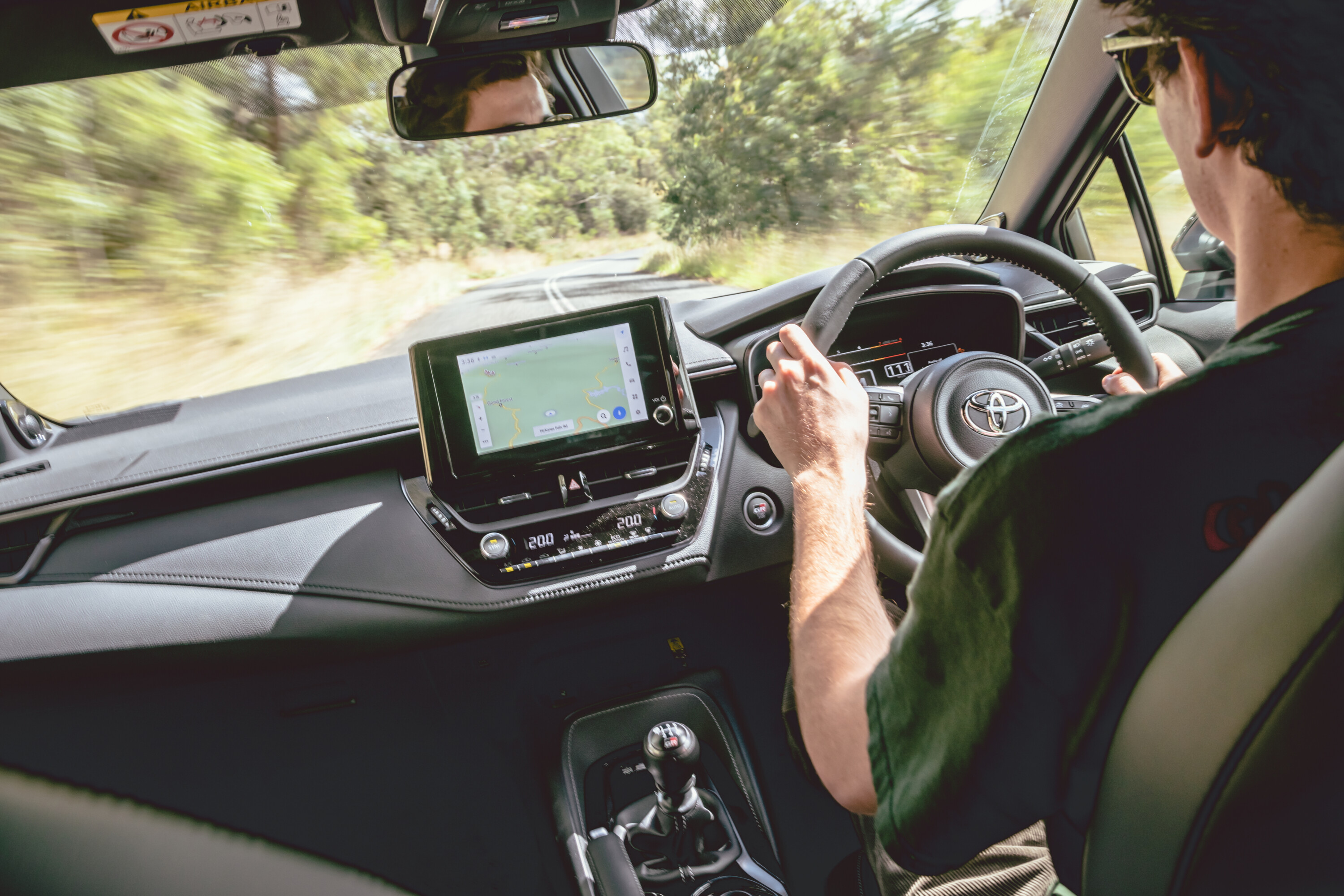
To get extra safety features including rear cross-traffic alert, blind-spot monitoring, and parking sensors, you’ll need to fit the convenience pack to the base Ascent Sport or splash out on a higher grade such as the SX.
How comfortable and practical is the Toyota Corolla?
The Toyota Corolla’s interior is comfortable and well-packaged – at least for front occupants – with some visual interest found further up the variant tree.
The Corolla’s isn’t the most spacious or cutting-edge cabin, but the materials will certainly stand the test of time.
Skipping the fleet-focussed Ascent Sport is wise as the interior’s drowned in firm grey plastics. The core design is pleasing enough, though, with a shapely, contemporary dash that has pleasingly simple and intuitive controls.
In Ascent Sport guise, the manually adjusted seats are trimmed in hardy cloth, while the coarse polyurethane steering wheel and shifter are far from joyful. Walking up to the SX maintains a conservative colour palate, but the leather-wrapped control surfaces make for a big jump in perceived quality.
The top-spec ZR’s leatherette/Ultrasuede power-adjustable front seats are supremely comfortable, and the whole cabin gets a number of sporty styling.
With two-stage heating, the seats have almost everything you could want, though the passenger’s pew has no height adjustment.
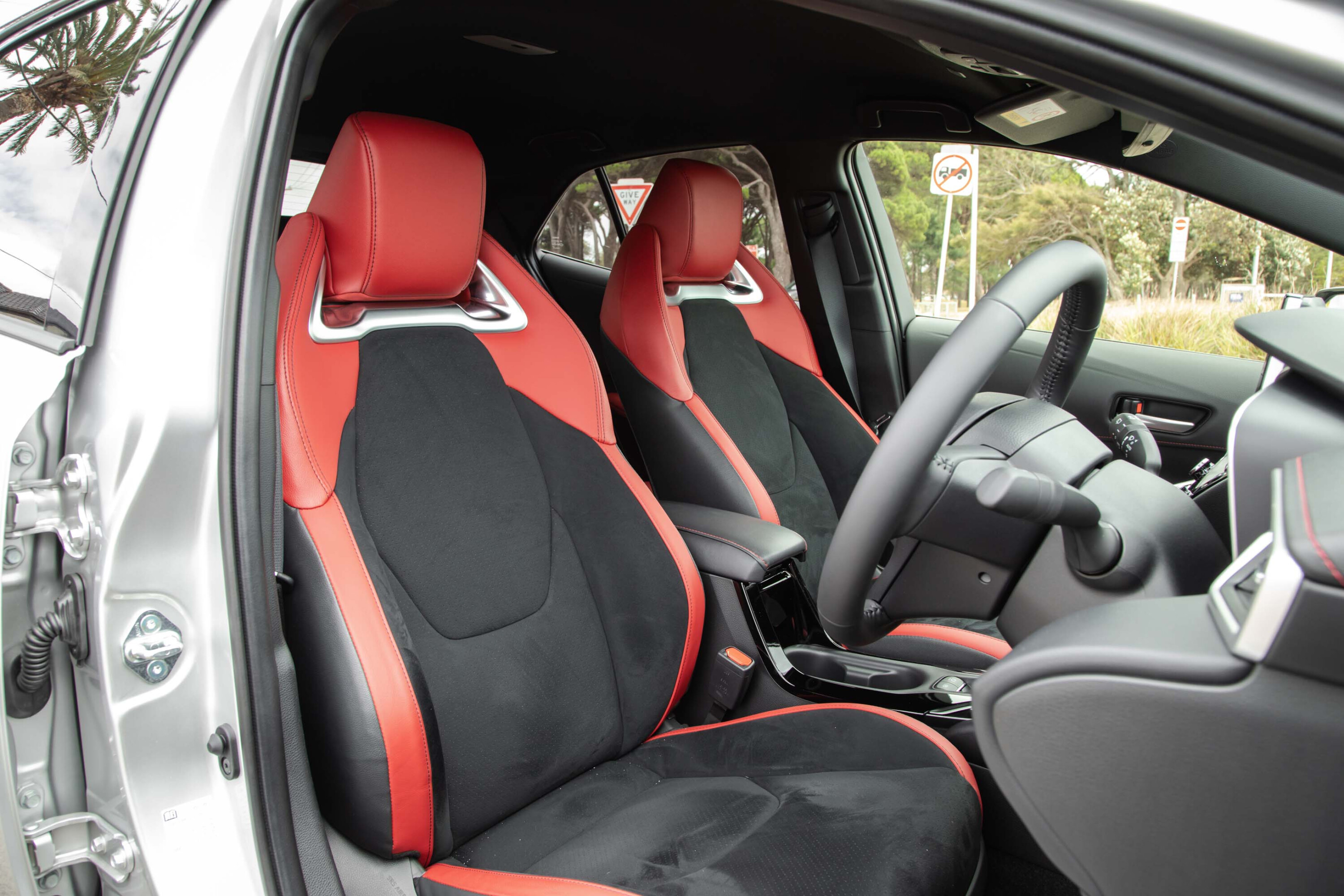
In the pursuit of light weight, GR has removed some sound deadening from the most hardcore Corolla, so it’s much louder than, for example, a Golf R.
That said, the GR Corolla maintains much of the core car’s comfort and usability, even adding a heated steering wheel.
Toyota’s latest 8.0-inch touchscreen amps technology and is much nicer to use than the old unit. Apple CarPlay is wireless, though Android Auto is wired. It can be laggy at times, but the display and integration of connected services are generally good.
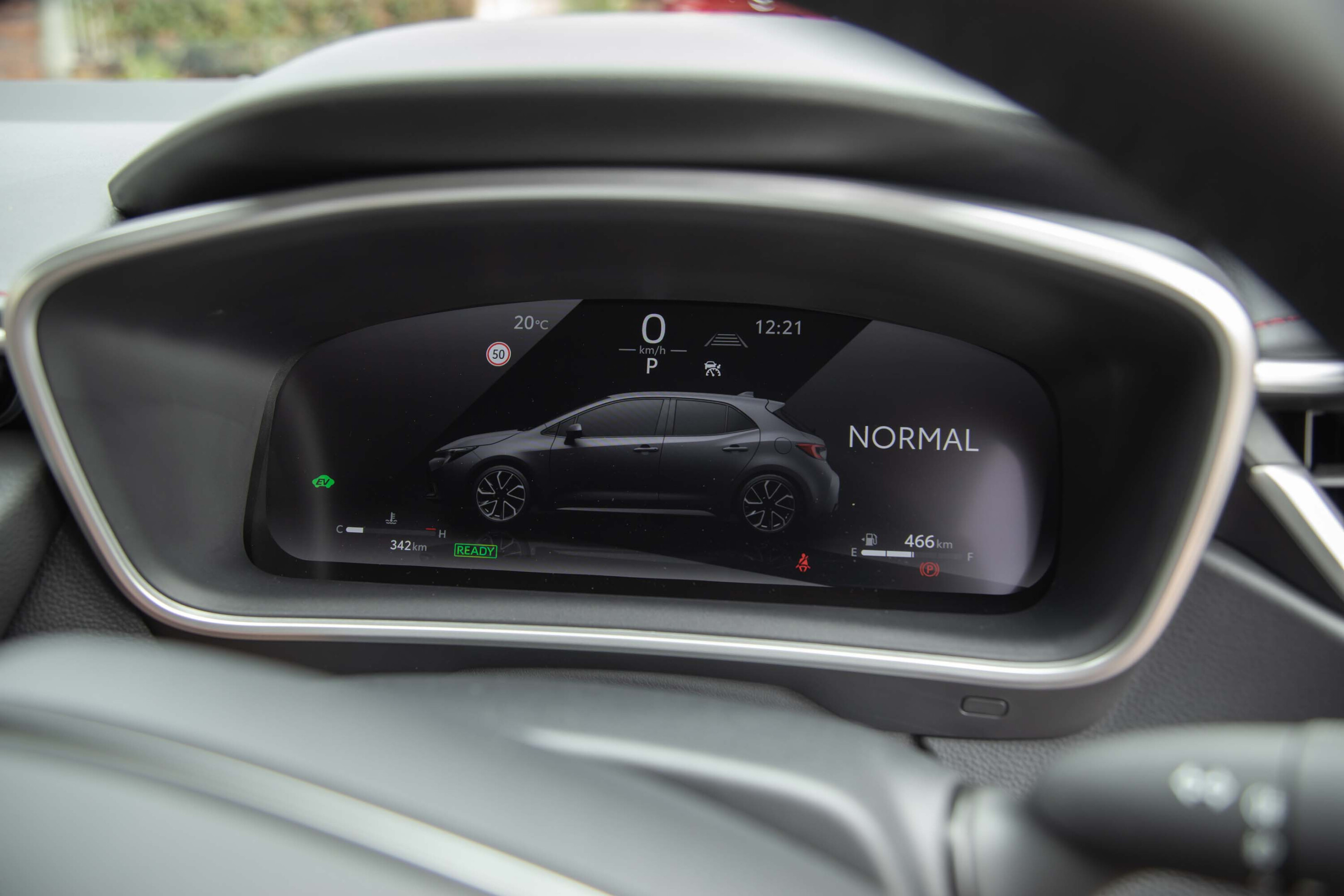
While the 7.0-inch digitised cluster in the Ascent Sport and SX is a step up from the old analogue dials, Toyota’s graphic design team could do with a crash course from some Apple engineers. The colours are dull and less sophisticated than rivals. Even the ZR’s 12.3-inch screen is lacking visual punch.
The hatch’s rear quarters are a little grim, especially for middle passengers. Of its competitor set, the Corolla hatch isn’t the most family-friendly small car.
There are niceties like a fold-down armrest and two door-mounted bottle holders across the range, though, and the sedan improves things with more legroom courtesy of a longer 2700mm wheelbase.
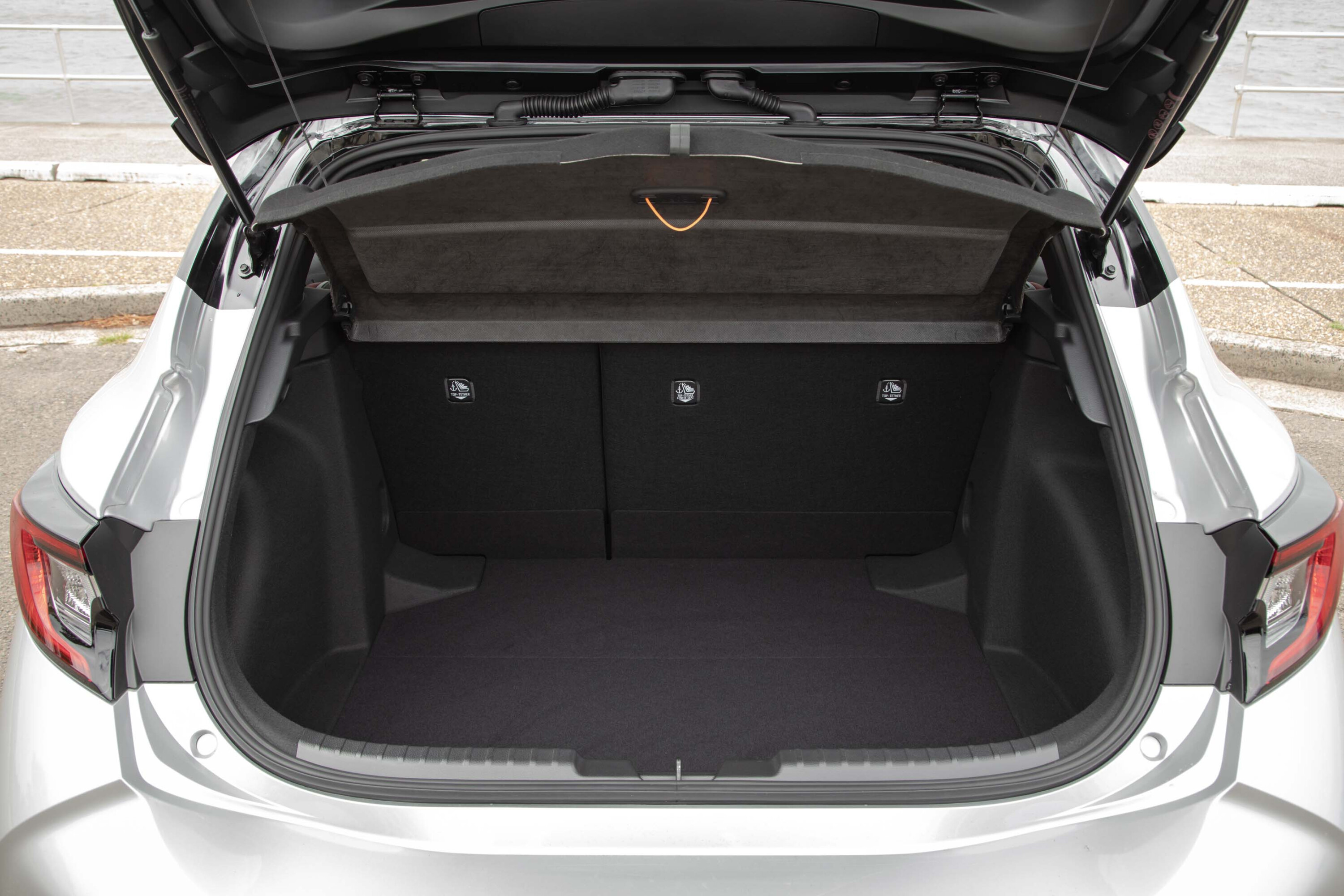
How much boot space does the Toyota Corolla offer?
A range of boot sizes feature across the Corolla range depending on trim level and body style, but none are particularly spacious – a common complaint for this generation of Corolla.
The best is the 440L sedan, with a measly 217 litres in the five-door hatches.
The ZR hybrid’s cargo area climbs to a more acceptable 333L, achieved by removing the space-saver spare tyre from under the boot floor and replacing it with a puncture repair kit.
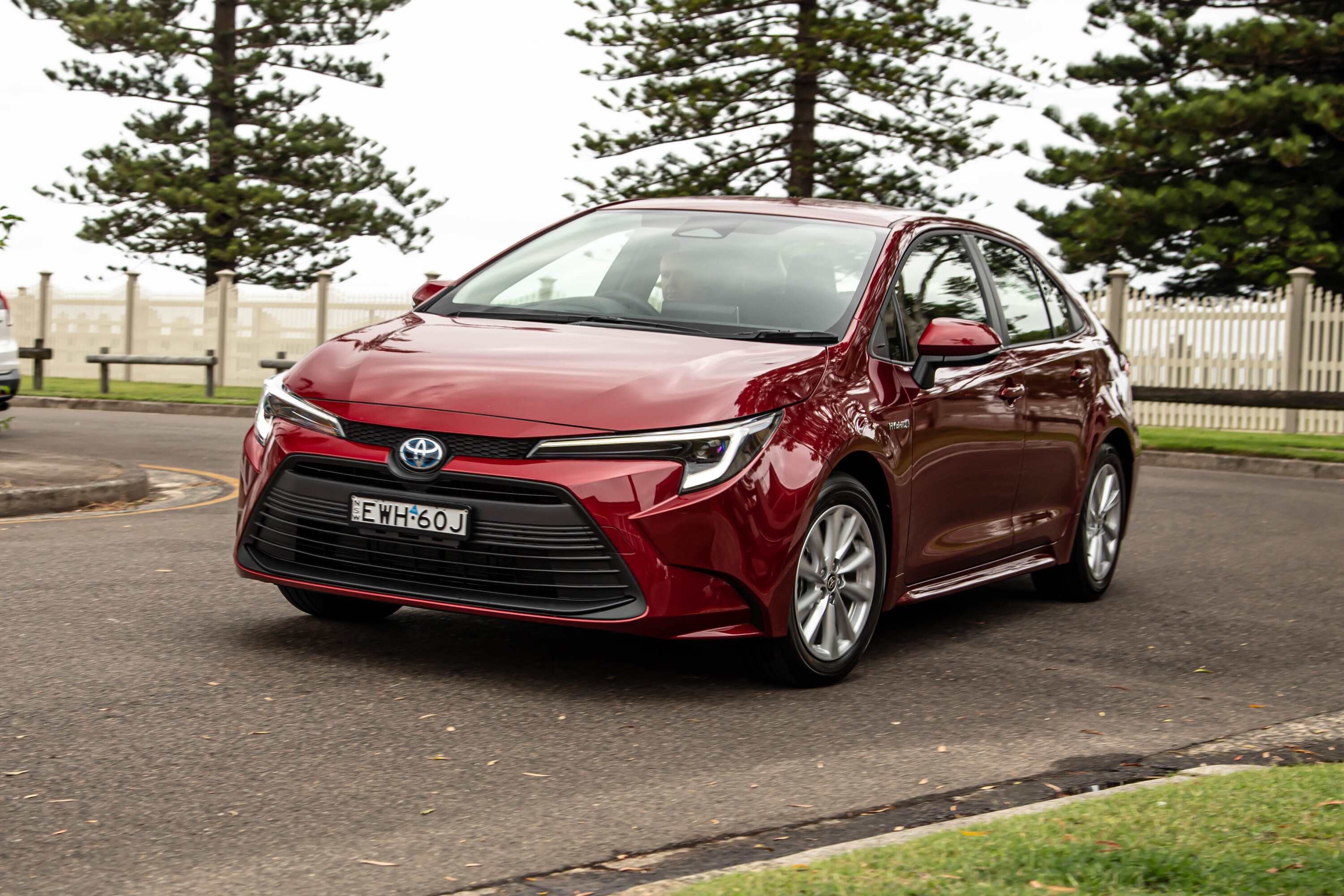
I like driving, will I enjoy this car?
As far as small cars go, the Toyota Corolla is one of the more dynamic with good steering and an exploitable chassis across the range – the AWD GR is a true driver’s car.
There are two main ingredients in the Corolla’s polished chassis: its TNGA underpinnings which have revolutionised driving experience across much of the Toyota model range, and independent trailing-arm rear suspension that separates it from mainly torsion bar-equipped rivals.
It results in a car that rides smoothly in base trim on small 16-inch alloys and pillowy eco tyres but also provides adjustability and driving enjoyment in the sporty ZR with its bigger rims and stickier Dunlop rubber.
This also provides an excellent platform for the AWD GR Corolla, with its extra bracing and stiffer suspension bringing true driving joy and engagement to the Corolla range.
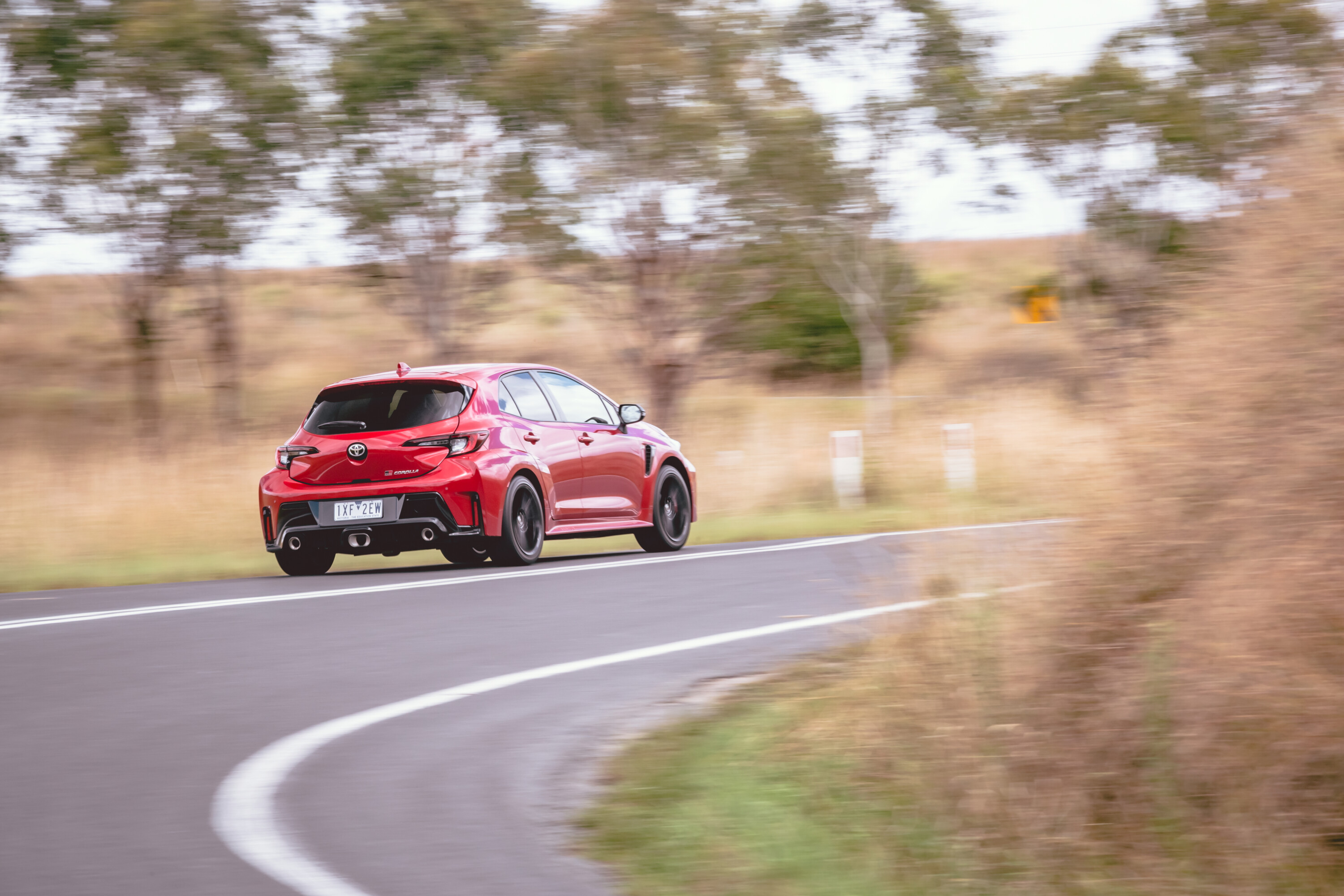
Powertrains offered on the Corolla are also good. Although a little old-school on paper, the 126kW/202Nm 2.0-litre ‘dynamic force’ petrol is revvy and responsive.
Things get a little loud under acceleration as the continuously variable transmission (CVT) flares engine revs (mid and top-spec cars get paddle shifters and simulated gear ratios), but the majority of the time it’s very liveable.
Replacing the previous 90kW 1.8-litre hybrid is a new 103kW system. Power is up thanks to more powerful motors and a switch from nickel-metal hydride to lithium-ion battery tech. It makes the petrol-electric Corolla even better; it remains our pick of the regular range.
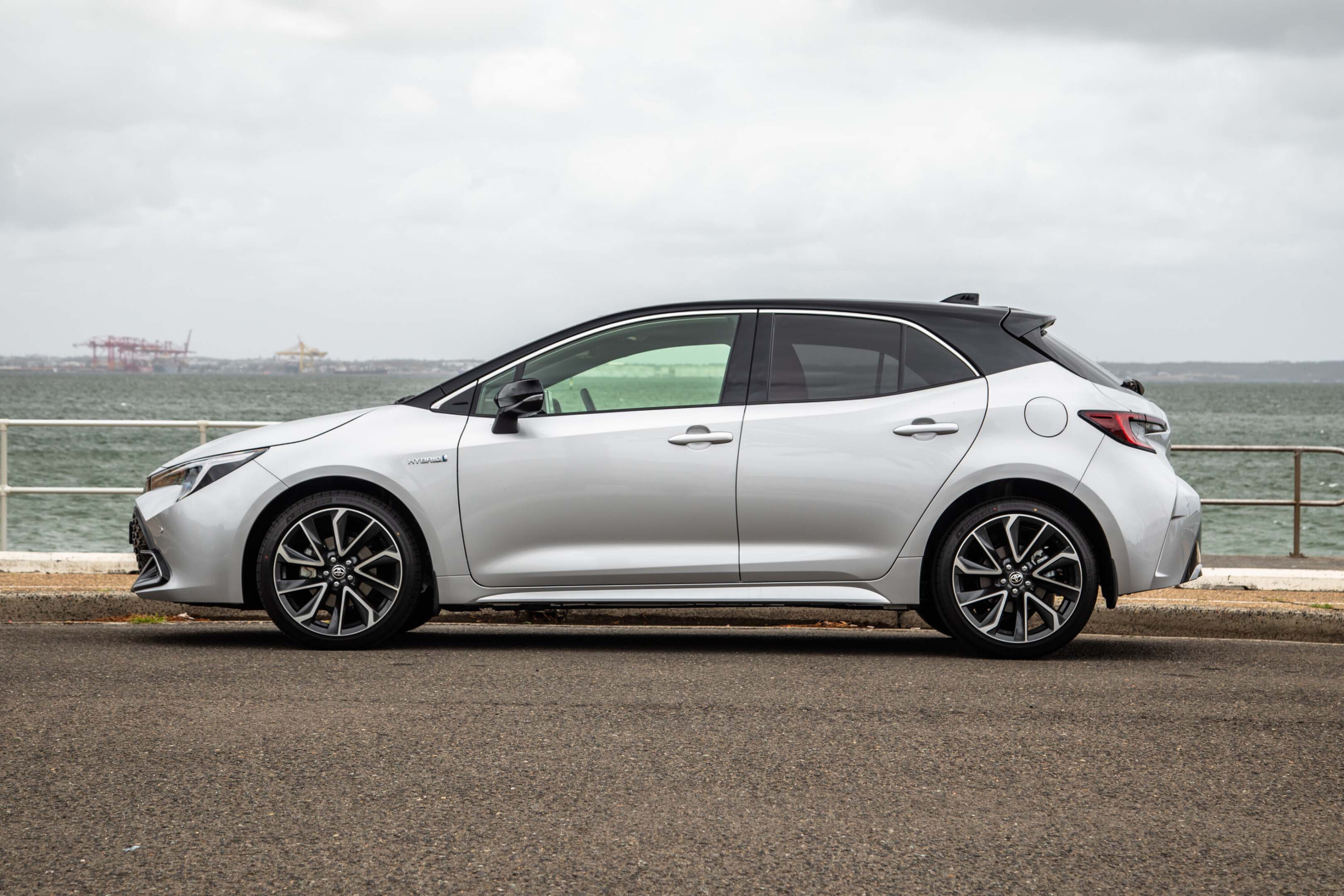
The hybrid also gets a clever transmission, known as e-CVT, which features a dual-input planetary gear design – quite different to the widely adopted belt-drive/conical-pulley CVT found in your average city run-around.
Above the cooking Corollas sits the scalded GR packing a 1.6-litre turbo-petrol three-cylinder developing a whopping 221kW. It’s an angry firecracker of a unit hooked up to a meaty and positive six-speed manual gearbox.
The GR Corolla’s suspension is firmer and its body stiffer, with genuine steering feedback and a sense of connection for the driver. Its all-wheel-drive system has adjustable torque splits and can send enough power to the rear wheels to make the GR Corolla slide around in slippery conditions.
If any of the terms in this section have left you scratching your head, these articles will help bring you up to speed!
- What is a Powertrain or Drivetrain?
- Power vs torque
- Car suspension explained
- Automatic transmissions (‘gearboxes’) explained
- Chassis control systems explained
- Car vs Ute vs SUV: How the vehicle you buy should guide the way you drive
If efficiency is what you desire from your small car, then look no further than the Corolla hybrid.
Despite becoming more powerful in 2023, the Corolla hatch’s ADR consumption dropped by 0.2L/100km – this comes down to a greater capacity lithium-ion battery and more powerful electric motors.
Compared to current competitors such as the Honda Civic E:HEV, the Corolla hybrid hatch’s 4.0L/100km ADR fuel consumption result is head and shoulders above rivals – the sedan goes even lower at 3.9L/100km.
Even the four-cylinder petrol engine, rated at 6.0L/100km, is relatively efficient for the class. At the bowser, the hybrid and petrol engines accept 91 RON and E10 blends.
What is the Toyota Corolla’s towing capacity?
If you’re looking for a tow car, there are better options.
But the Corolla petrol is certified to tow 450kg unbraked or 1300kg braked loads. The hybrid is not rated for towing.
How long is the warranty and what are the Toyota Corolla’s servicing costs?
The Toyota Corolla is covered by a five-year/unlimited-kilometre warranty. Keeping your servicing up to date at a Toyota dealer will see this extended to eight years for the hybrid powertrains.
Service pricing is capped for the first five years to just $205 per visit, for a 75,000km total of $1025. Maintenance is due every 12 months or 15,000km on regular Corollas.
The GR Corolla is a little more involved, needing to see a spanner every six months or 10,000km. It’ll cost you $1800 to maintain over three years or 60,000km.
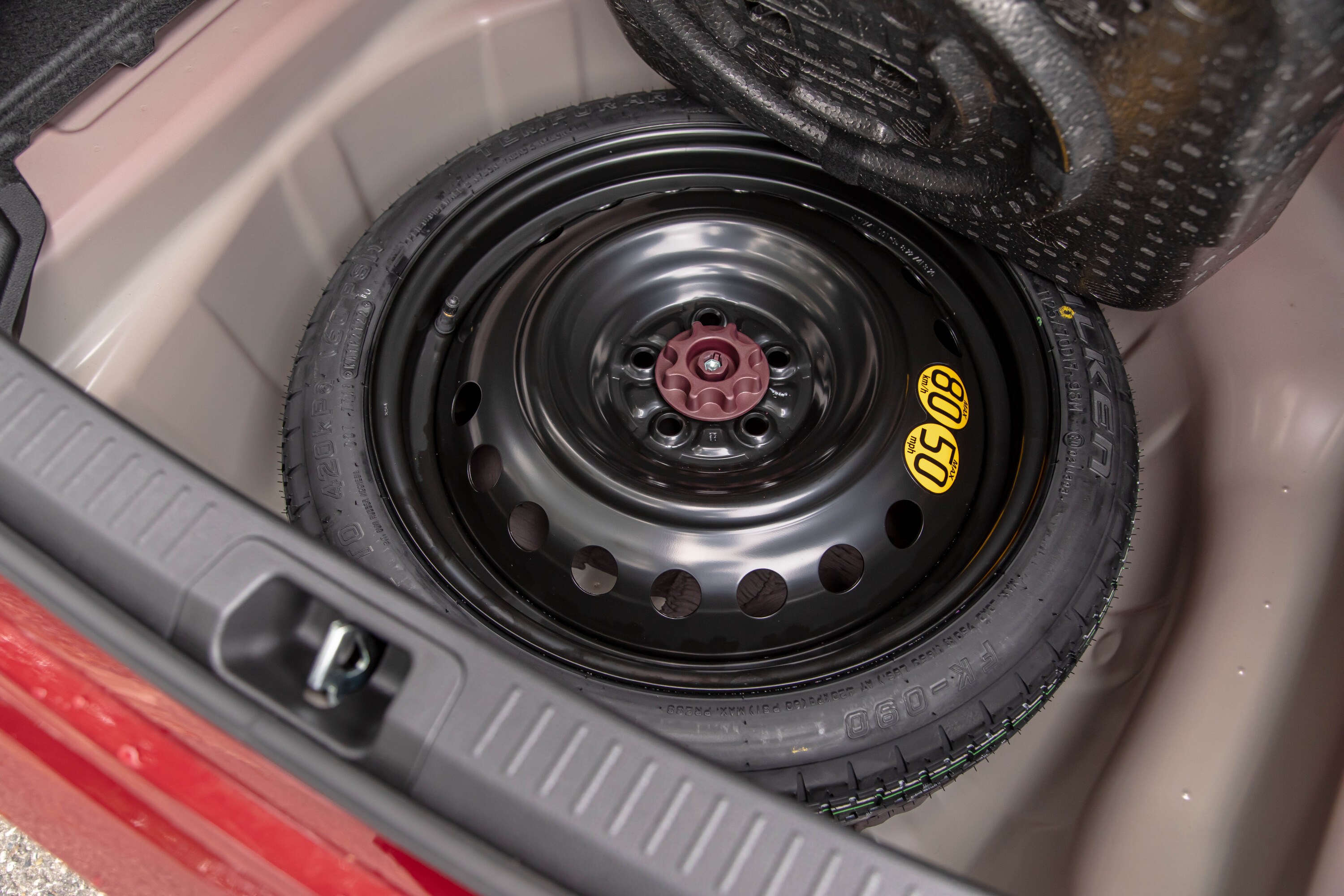
Which version of the Toyota Corolla does Wheels recommend?
If you’re a budding Sebastien Loeb (or Ogier, for that matter), then you’ll fall in love with the focused GR Corolla – we certainly have at the Wheels office.
However, the best Corolla for most is the hybrid in a trim you can afford. The mid-spec SX is decently equipped for the price. With cheap servicing and limited fuel use, it’ll be a joy to own over an extended period. The flashier ZR is also a nice option with a bit more jazz – regardless, we recommend jumping above the Ascent Sport if you have the means.
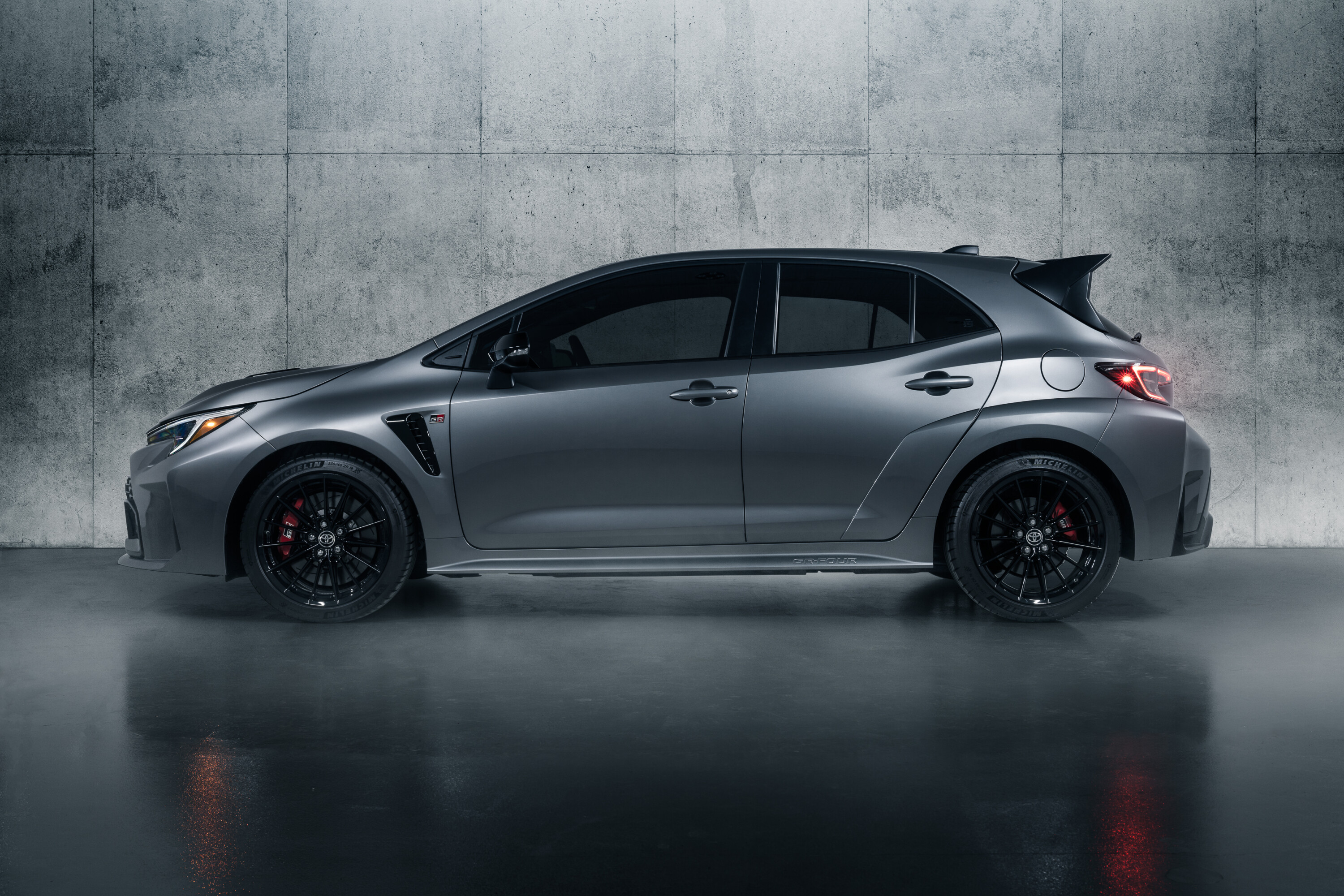
What are the Toyota Corolla’s key rivals?
ud83dudd3c Back to topWhat might annoy me?
While the Corolla ticks many boxes and is unlikely to frustrate any owner, there are a few consistent gripes you’ve probably heard before.
Boot: small; rear seat: not exactly spacious; as good as Toyota’s CVT is, it’s also still a CVT; and the likelihood is, you’ll be waiting a while for a Corolla.
Less obvious annoyances include the hybrid’s slightly unnatural and granular brake feel as it balances regenerative with friction braking. Safety is also worth mentioning, as the five-year-old Corolla doesn’t have the same technology as some rivals, especially in base Ascent Sport trim without rear cross-traffic alert and rear parking sensors.
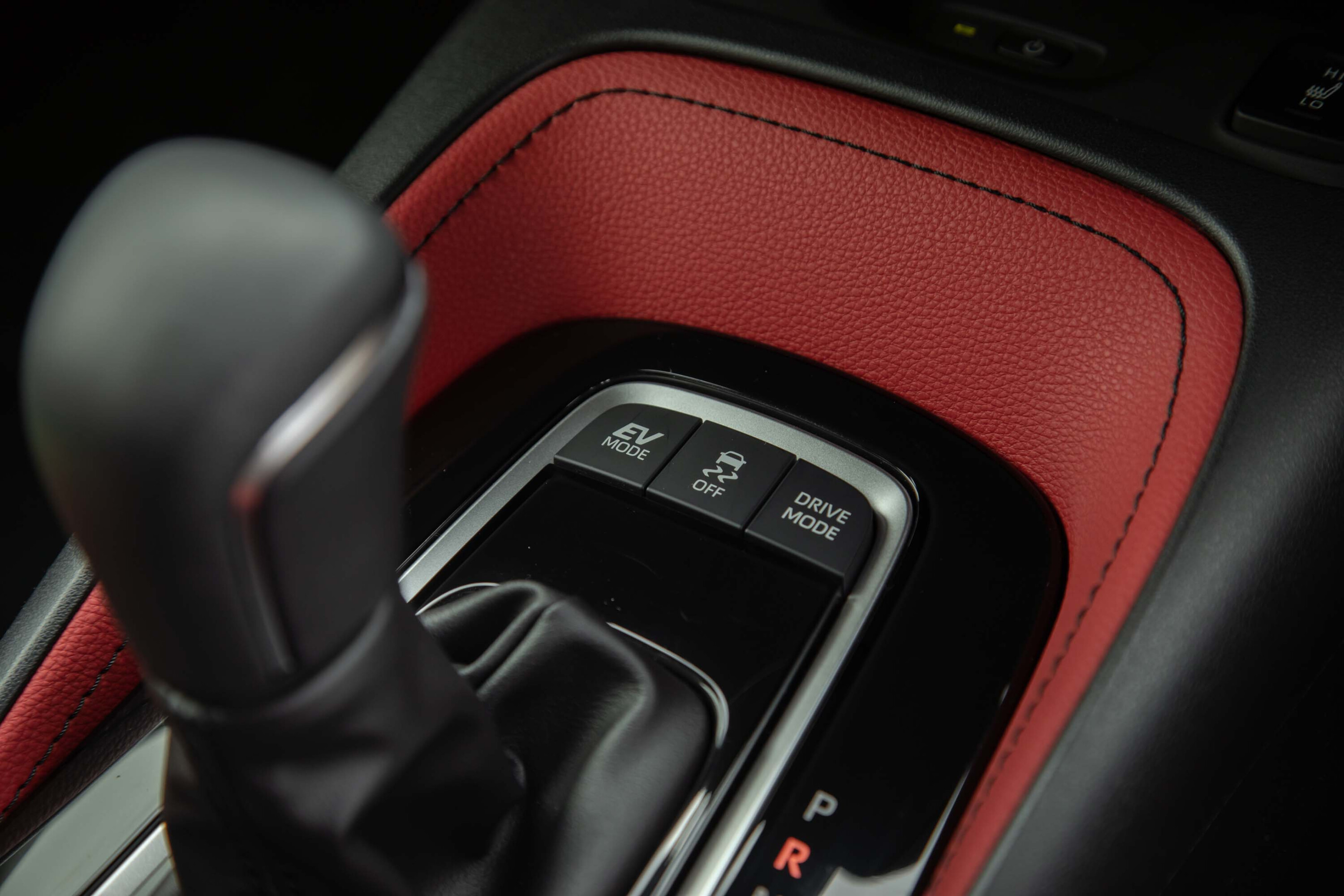
What might I miss that similar cars have?
The Corolla range is endowed with good engines and a sporty option but at nearly $62K plus on-road costs, the hardcore GR flagship doesn’t come cheap and there is no other performance-oriented variant to bridge the gap.
Other brands, including Hyundai with N Line and Kia with its GT range, have enthusiasts on a budget better covered.
Toyota Australia doesn’t sell a Corolla wagon (Finland’s best-selling car in 2022) either, so the local range could be broader and more practical. The wagon role is instead filled by the Corolla Cross SUV.
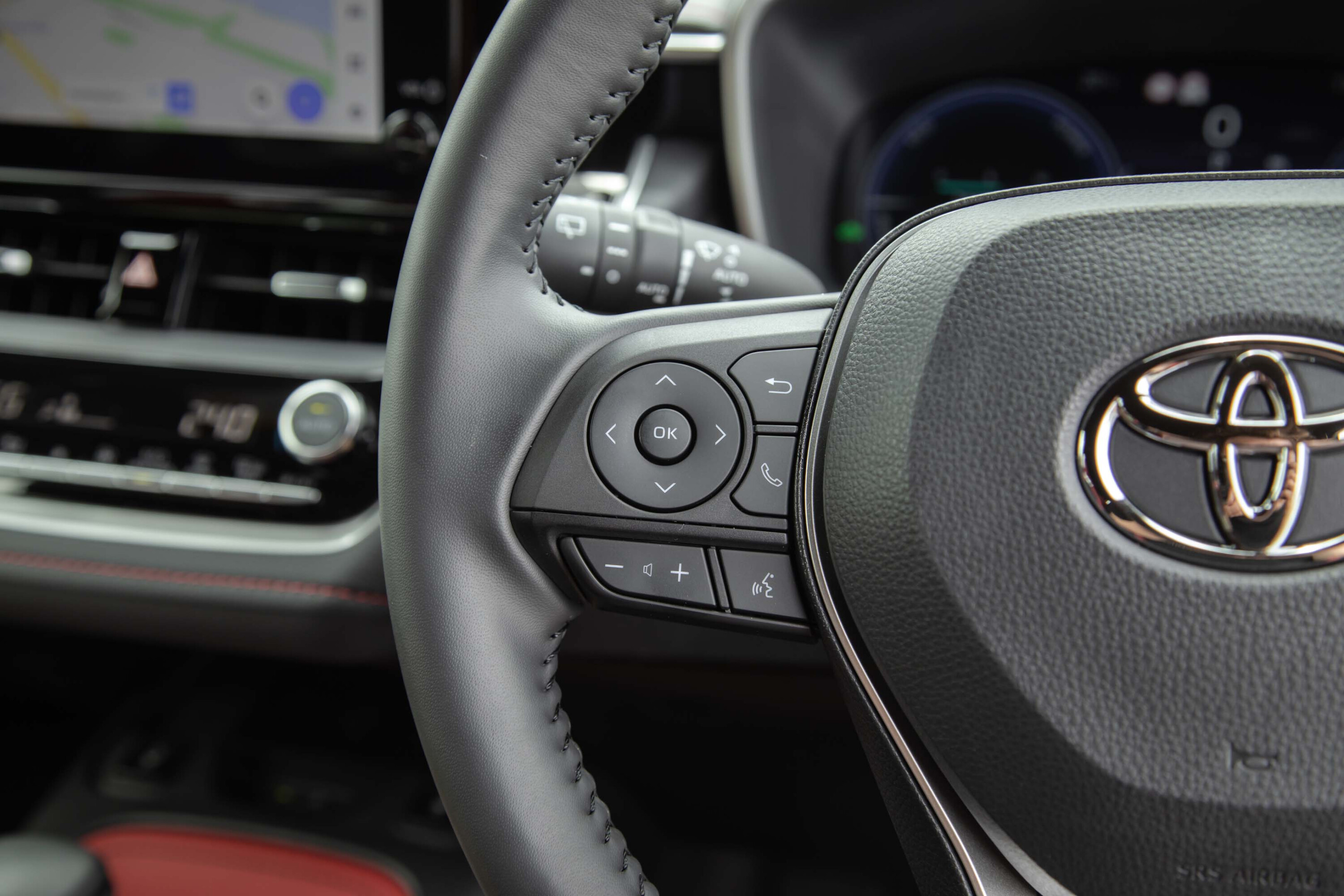
What’s the infotainment system like?
For the current model every Corolla gets an 8.0-inch touchscreen including the base model.
Japan gets a bigger 10.5-inch item that we see only in the Corolla Cross SUV, but the smaller interface is powered by similar hardware.
Though the handy shortcut buttons have been lost, the new navigation screen is brighter and more reminiscent of Google Maps, and there’s reliable wireless Apple CarPlay connectivity (though Android Auto remains wired).
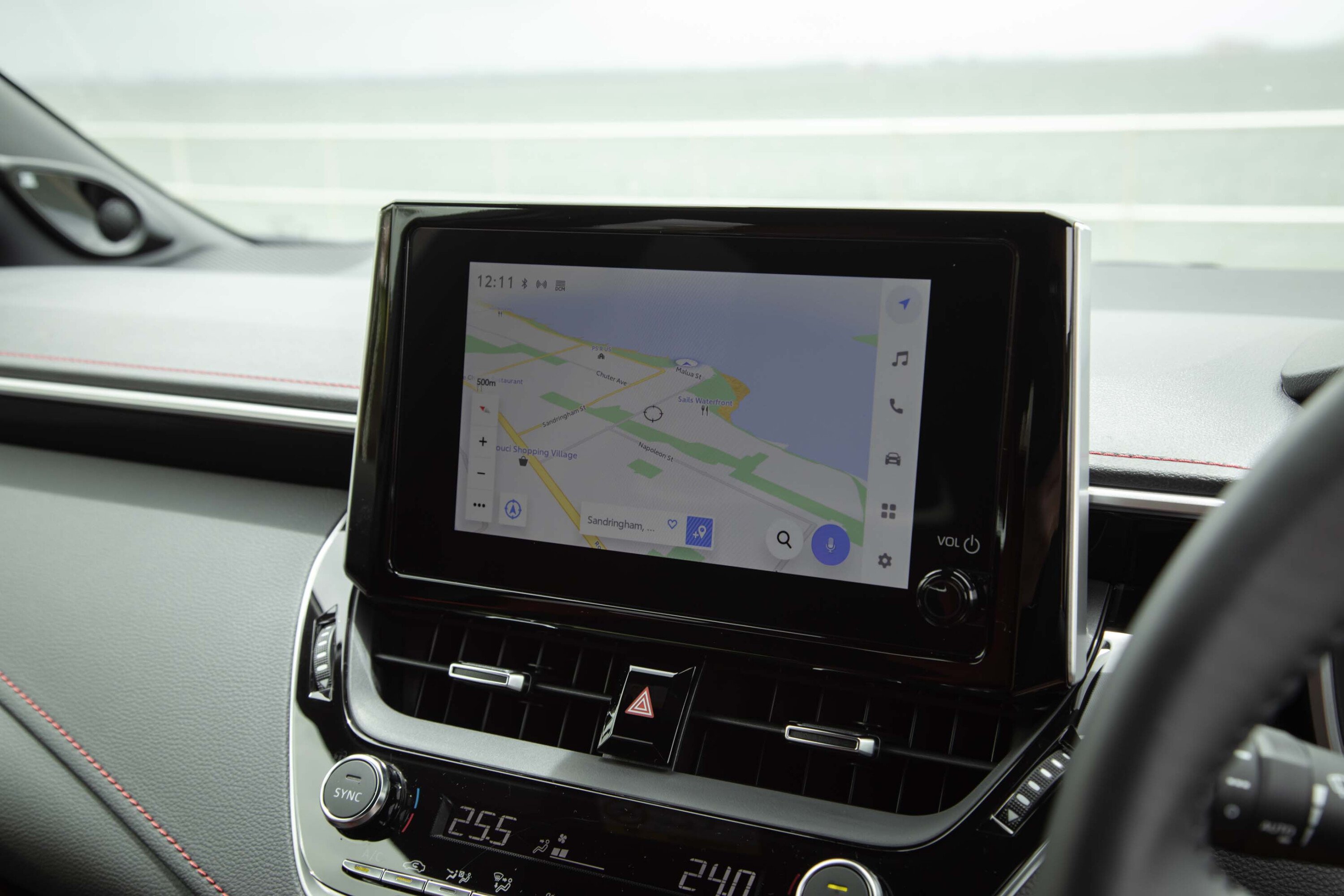
Along with the new screen, a year’s subscription to Toyota Connect – a phone app that offers remote control features as well as telematics when things go awry that can call emergency services if needed – is included free.
From the SX and up, you get a more powerful connected services package that allows send-to-car navigation directions and additional user profile settings. The basic package is an ongoing cost of $9.95/month after the first year, and the more involved telematics are $12.50/month on top of that.
Where does Toyota make the Corolla?
Australian-delivered Corollas are assembled in Toyota’s Japanese production facilities.
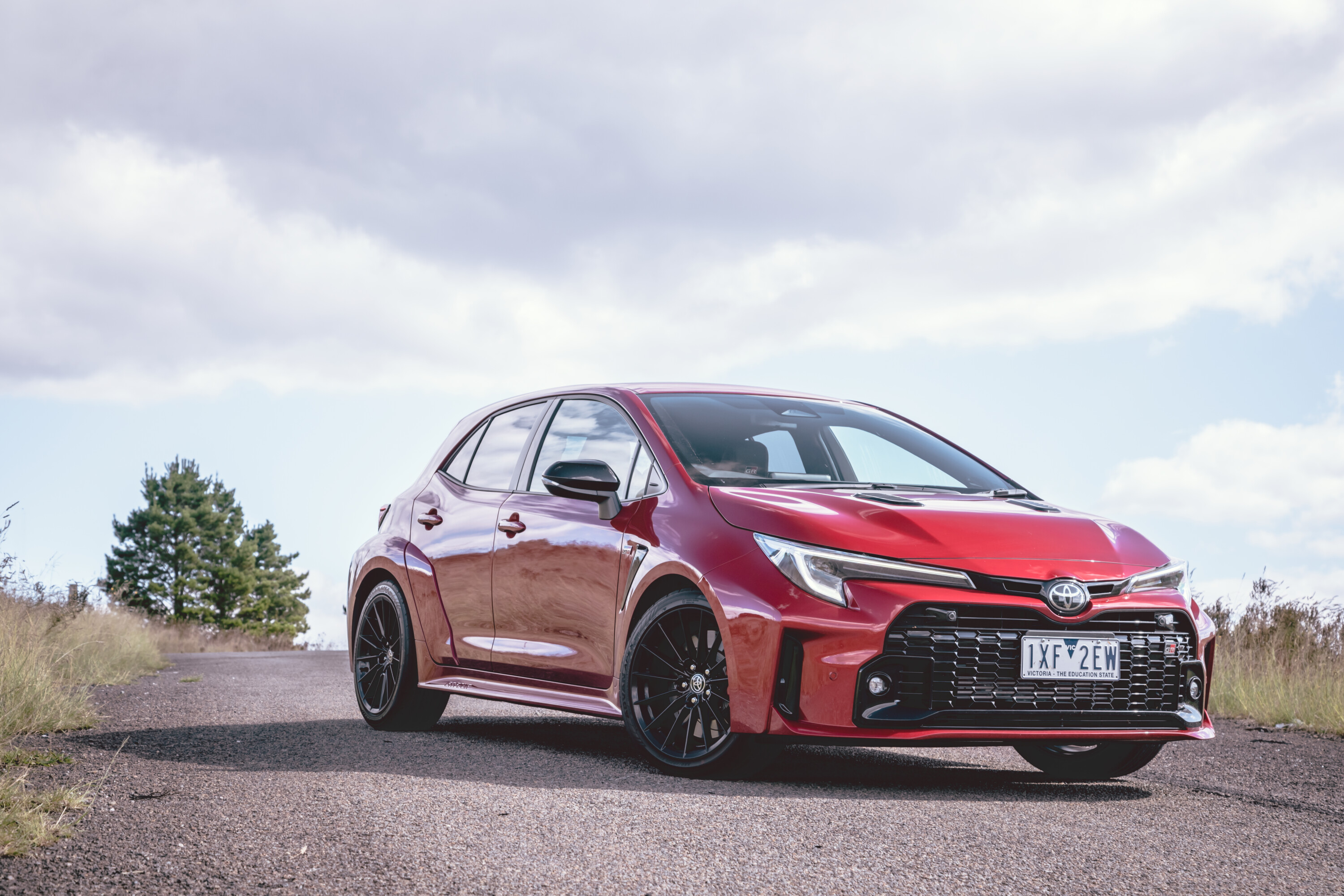
Are there plans to update the Corolla soon?
The Toyota Corolla range was given a mild update in 2022 for 2023, which has now carried over to the 2024 model year.
It has not received a major facelift in its life and is likely to continue in its current state for another three or four years, at which point it will be replaced by a new model.
More guides to help you choose the best car & tyres for your needs
- All tyre news & reviews
- Longest warranties & capped-price servicing period
- Buy new or used?
- Best cars for your teenager
- Must-have features for new drivers
- Active safety tech explained
- Australian road rules explained
- Does driving slower save fuel?
- Does my car need the pricier fuel?
- Help, I’ve used the wrong fuel!
- What is a hybrid car?
- How long do tyres last?
- What shoes should I wear to drive?
- What to do after buying a new car
- How much does LCT add to a car’s price?
- The ‘check engine’ light just came on…
- Is it illegal to drive too slowly in Oz?
- FWD v RWD v AWD – which is safer?
- How much can my large SUV tow?
Score breakdown
Things we like
- Comfortable ride
- Fuel-sipping hybrid powertrains
- MY23’s updated technology
- GR Corolla flagship
Not so much
- Hatch’s tiny boot
- Ascent Sport’s plastic steering wheel
- Tight back seat
- Connected services cost after 12 months

